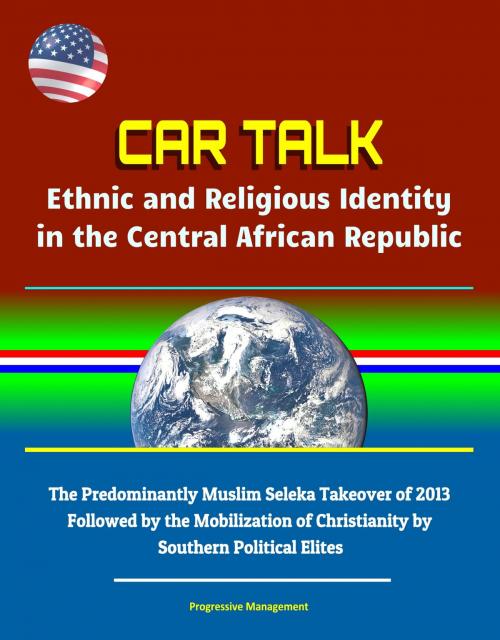CAR Talk: Ethnic and Religious Identity in the Central African Republic - The Predominantly Muslim Seleka Takeover of 2013, Followed by the Mobilization of Christianity by Southern Political Elites
Nonfiction, History, Africa, Social & Cultural Studies, Political Science| Author: | Progressive Management | ISBN: | 9780463457832 |
| Publisher: | Progressive Management | Publication: | June 26, 2018 |
| Imprint: | Smashwords Edition | Language: | English |
| Author: | Progressive Management |
| ISBN: | 9780463457832 |
| Publisher: | Progressive Management |
| Publication: | June 26, 2018 |
| Imprint: | Smashwords Edition |
| Language: | English |
This important December 2017 report has been professionally converted for accurate flowing-text e-book format reproduction.
This study examines the prioritization of religious identity among Central Africans in the wake of the 2013 Seleka crisis. Before the Seleka came to power, ethnicity was the identity that had the most political salience in the Central African Republic. During the crisis, religious identity was prioritized over all others. This study researched a number of possible causes of this identity shift, from the agendas of domestic and foreign politics to mass-level tensions and demographic changes. This study argues that the prioritization of religious identity over ethnic identity among Central Africans is an example of an elite-driven identity change. After being driven from power, southern political elites mobilized Christianity in response to the Seleka takeover because it was an identity the majority of southern Central Africa could rally behind.
I. INTRODUCTION * A. MAJOR RESEARCH QUESTION * B. SIGNIFICANCE OF THE RESEARCH QUESTION * C. LITERATURE REVIEW * D. POTENTIAL EXPLANATIONS AND HYPOTHESES * E. RESEARCH DESIGN * F. STUDY OVERVIEW * II. CONTEXTUAL BACKGROUND * A. HISTORICAL BACKGROUND * 1. Early History and Independence * 2. Mobilization of Ethnic Identity Among Southern Elites * 3. The Rise of Chadian Influence and the Incidental Muslim Takeover * 4. Southern Response to the Seleka Takeover * B. RELIGIOUS CONTEXT * C. CONCLUSION * III. ENABLING THE ELITES: MASS-LEVEL DYNAMICS * A. REMOTENESS OF THE NORTHEAST AND CENTRAL AFRICAN IDENTITY * B. OCCUPATIONAL DIFFERENCES ENCOURAGE SECTARIAN DISTRUST * C. INCREASED USE OF TELECOMMUNICATIONS INCREASED FEARS * D. CONCLUSION * IV. DOMESTIC ELITE CAPITALIZATION AND CAUSES OF IDENTITY SHIFT * A. SOUTHERN ELITE CHARACTERISTICS * B. STRUCTURES AND INCENTIVES * C. RHETORIC, SIGNALING, AND ACTIONS IN THE SELEKA CRISIS * D. MOBILIZING SINCE THE SELEKA'S DEPARTURE FROM POWER * E. CONCLUSION * A. FINDINGS * B. IMPLICATIONS * C. FUTURE RESEARCH * D. IMPLICATIONS FOR THE DEPARTMENT OF DEFENSE
This important December 2017 report has been professionally converted for accurate flowing-text e-book format reproduction.
This study examines the prioritization of religious identity among Central Africans in the wake of the 2013 Seleka crisis. Before the Seleka came to power, ethnicity was the identity that had the most political salience in the Central African Republic. During the crisis, religious identity was prioritized over all others. This study researched a number of possible causes of this identity shift, from the agendas of domestic and foreign politics to mass-level tensions and demographic changes. This study argues that the prioritization of religious identity over ethnic identity among Central Africans is an example of an elite-driven identity change. After being driven from power, southern political elites mobilized Christianity in response to the Seleka takeover because it was an identity the majority of southern Central Africa could rally behind.
I. INTRODUCTION * A. MAJOR RESEARCH QUESTION * B. SIGNIFICANCE OF THE RESEARCH QUESTION * C. LITERATURE REVIEW * D. POTENTIAL EXPLANATIONS AND HYPOTHESES * E. RESEARCH DESIGN * F. STUDY OVERVIEW * II. CONTEXTUAL BACKGROUND * A. HISTORICAL BACKGROUND * 1. Early History and Independence * 2. Mobilization of Ethnic Identity Among Southern Elites * 3. The Rise of Chadian Influence and the Incidental Muslim Takeover * 4. Southern Response to the Seleka Takeover * B. RELIGIOUS CONTEXT * C. CONCLUSION * III. ENABLING THE ELITES: MASS-LEVEL DYNAMICS * A. REMOTENESS OF THE NORTHEAST AND CENTRAL AFRICAN IDENTITY * B. OCCUPATIONAL DIFFERENCES ENCOURAGE SECTARIAN DISTRUST * C. INCREASED USE OF TELECOMMUNICATIONS INCREASED FEARS * D. CONCLUSION * IV. DOMESTIC ELITE CAPITALIZATION AND CAUSES OF IDENTITY SHIFT * A. SOUTHERN ELITE CHARACTERISTICS * B. STRUCTURES AND INCENTIVES * C. RHETORIC, SIGNALING, AND ACTIONS IN THE SELEKA CRISIS * D. MOBILIZING SINCE THE SELEKA'S DEPARTURE FROM POWER * E. CONCLUSION * A. FINDINGS * B. IMPLICATIONS * C. FUTURE RESEARCH * D. IMPLICATIONS FOR THE DEPARTMENT OF DEFENSE















